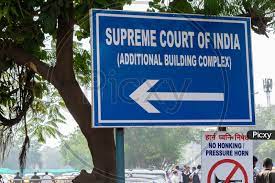Soon thereafter, the appellants filed a suit for eviction, being title Suit No.667/2013 against the respondent-tenant for non-payment of rent. (Para 1)
In the proceedings, the respondent made an application under Sections 7(1) and (2) of the West Bengal Premises Tenancy Act, 1997 (hereinafter referred to as the ‘said Act’). The application was rejected by the Trial Court vide a judgment dated 11.09.2018 on the ground that the respondent had entered appearance in the suit on 09.02.2016 but filed the application only on 14.12.2016 i.e., after a delay of ten months. (Para 2)
High Court set aside the judgment dated 11.09.2018 and granted liberty to the respondent-tenant to file an application under Section 5 of the Limitation Act, 1963 explaining the circumstances causing the delay for the purpose with the prayer for condonation of delay in support of the application under Sections 7(1) and 7(2) of the said Act already filed. (Para 4)
We may notice that the ground sought to be made out by the respondent-tenant was that his failure to deposit arrears of rent coupled with monthly rent was on account of ill-advise by his advocate that no steps were required to be taken in view of the stay granted by the High Court in C.O. No.233/2006. The respondent claimed that having become cognizant of this, he made amends by filing the written statement on 14.12.2016 along with the application under Sections 7(1) and 7(2) of the said Act, which was rejected. The High Court directed the Trial Court to dispose of the application under Section 5 of the Limitation Act, if any, filed within the stipulated period mentioned without granting any unnecessary adjournments and preferably within two months from the date of filing of the application. (Para 5)
On the other hand, the submission of the learned counsel for the appellant is that the said provision is the general provision, but where a lesser period is provided for any purpose, then that period cannot be expanded by taking recourse to the general provision under the Limitation Act, 1963. (Para 12)
We have no doubt over the proposition that though generally the Limitation Act is applicable to the provisions of the said Act in view of Section 40 of the said Act, if there is a lesser time period specified as limitation in the said Act, then the provisions of the Limitation Act cannot be used to expand the same. (Para 16)
We are of the view that a combined reading of the two statutes would suggest that while the Limitation Act may be generally applicable to the proceedings under the Tenancy Act, the restricted proviso under Section 7 of the said Act, providing a time period beyond which no extension can be granted, has to be applicable. The proviso is after Sub-Section (2) of Section 7 but Sub-Section (2) of Section 7 in turn refers to Sub-Section (1) implying the application of the proviso to Sub-Section (1) too. (Para 17)
The needful has to be done within the time stipulated and actually should accompany the application filed under Sub-Sections (1) & (2) of Section 7 of the said Act. The proviso only gives liberty to extend the time once by period not exceeding two months. (Para 18)
The respondent neither paid the rent, nor deposited the rent by moving the application nor deposited it within the extended time as stipulated in the proviso. The mere allegation of absence of correct legal advice cannot come to the aid of the respondent as if such a plea was to be accepted it would give a complete license to a tenant to occupy premises without payment of rent and then claim that he was not correctly advised. If the tenant engages an advocate and abides by his advice, then the legal consequences of not doing what is required to be done, must flow. (Para 19)
We have also been given a statement of arrears of rent, which would show that for 142 months i.e., from February 2005 till filing of the petition under Section 7 of the said Act in December, 2016, rent was not paid (Para 20)
We, thus, have no hesitation in coming to the conclusion that the impugned order of the High Court dated 21.08.2019 is not sustainable and the same is accordingly set aside while sustaining the order of the Trial Court dated 11.09.2018. (Para 21)
SUPREME COURT OF INDIA
2023 STPL(Web) 354 SC
[2023 INSC 923]
Debasish Paul & Anr Vs. Amal Boral
Civil Appeal No.6565 of 2023-Decided on 18-10-2023.
https://stpllaw.in/wp-content/uploads/2023/10/2023-STPLWeb-354-SC.pdf







